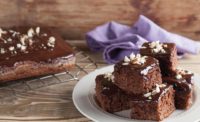Six Ingredient Trends to Keep an Eye on in 2025
Health and wellness ingredients will move deeper into consumer acceptance in the new year

The variety of fruits, vegetables, and other foods that can be fermented for flavor and health is limited only by the creativity of the formulators.
PHOTO COURTESY OF: Olive My Pickle/The Pickle Factory Co.
1. Adaptogens and Stress-Relief Ingredients
Consumers are increasingly turning to adaptogens—natural substances that help the body adapt to stress and restore balance. Ingredients like ashwagandha, rhodiola, and ginseng are being incorporated into beverages, snacks, and even desserts. Expect expanded applications in ready-to-drink (RTD) teas, protein bars, and functional chocolates.
2. Nootropics for Cognitive Support
With a rising focus on brain health, nootropics will play a larger role in food and beverage formulation. Ingredients like L-theanine, lion’s mane mushroom, and phosphatidylserine are being used to enhance focus, memory, and mental clarity. These are making their way into functional coffees, waters, and even savory snacks.
3. Prebiotics and Postbiotics
Gut health continues to dominate consumer interest, but the focus is shifting to prebiotics (which feed beneficial gut bacteria) and postbiotics (byproducts of fermentation that offer health benefits). Chicory root fiber, resistant starch, and fermented grains are being integrated into baked goods, dairy alternatives, and snack bars.
4. Botanicals and Herbal Infusions
Herbs and flowers traditionally linked to wellness are expanding into new categories. Chamomile, lavender, hibiscus, and elderberry are showing up in functional sparkling waters, kombuchas, and confections for their calming, anti-inflammatory, and antioxidant properties.
5. Magnesium and Electrolytes for Relaxation and Recovery
Magnesium, known for its role in muscle relaxation and stress relief, is increasingly being added to functional drinks and sports recovery products. Blends combining magnesium, potassium, and sodium target hydration, relaxation, and post-workout recovery.
6. Sleep-Supportive Ingredients
The interest in sleep-enhancing formulations is driving the use of ingredients like tart cherry (natural melatonin), valerian root, and passionflower. These are appearing in RTD teas, functional gummies, and bedtime snacks.
Looking for a reprint of this article?
From high-res PDFs to custom plaques, order your copy today!





